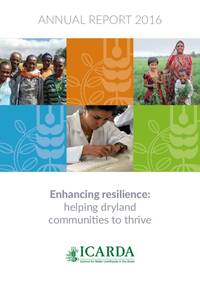ICARDA Annual Report 2016

Authors:
2016 was the hottest year on record – the third consecutive record-breaking year. It was a sign that we have to act fast to enhance the resilience of dryland farmers, who not only have to contend with more extreme temperatures but also face rapidly depleting water resources and the destructive effects of new pests and disease.
Farmers are on the frontline in the fight against climate change. Many are already struggling to produce sufficient food, particularly in the dry areas of the developing world, where shifting weather patterns are generating immense challenges and food import burdens continue to grow, exposing ordinary people to the vagaries of global commodity markets.
Delivering practical solutions that farmers can utilize to raise their productivity is therefore critical: improved climate-resilient crops, sustainable land and water management practices, enhanced livestock productivity, and valueadded production are key to effective climate change adaptation. Each forms an integral part of ICARDA’s new Research Strategy (2017–2026), which supports the Center’s vision of thriving and resilient livelihoods.
